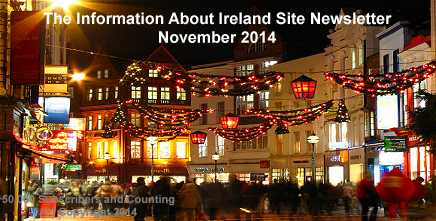
|
||
|
KEEP THIS NEWSLETTER ALIVE!
NEED A WEDDING, ANNIVERSARY OR BIRTHDAY GIFT? |
||
|
Shop Online at WWW.IRISHNATION.COM
|
||

Marvelous Family Crest Shields and Plaques |
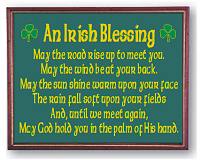
Meaningful Stocking-Filler Signs |
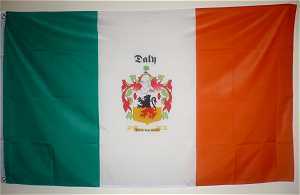
Family Crest Flags. White-Background or Ireland Flag |

Gorgeous Galway Crystal |

Personalized Christmas Decorations |

Jewelry made from Genuine Irish Coins |
| More Gift Ideas From Ireland | ||
============
IN THIS ISSUE
============
=== News Snaps from Ireland
=== Christmas Traditions of Ireland
=== Holding The Flashlight - A Story by Marie O'Byrne
=== Gaelic Phrases of the Month
=== Monthly Free Competition Result
Popular Articles from Recent Newsletters:
'I'm Grand. I'm Grand.' - a story
Inventions you never knew were Irish
22 Quotes About Being Irish
==========
FOREWORD
==========
|
Hi again from Ireland where the annual madness that is Christmas shopping is upon us. The now traditional 'Black Friday' fights and scuffles in shopping malls were again relayed over the Web to the amazement and despair of just about everyone (with the exception of those who had queued for hours).
Earlier this month there was a quite bizarre incident that thankfully did not escalate into worse violence. The Deputy Leader of the Government was trapped in a car for three hours while protesters refused to let her leave - read more in the news-snaps below. Incredible suff. Until next time, stay safe! Michael |

PLEASE 'LIKE US' ON FACEBOOK!
P.S. Please DO FORWARD this Newsletter to a
friend or relative. If you have a website or Facebook
page or Blog (or whatever!) then you can help
us out by putting a link on it to our website:
www.ireland-information.com
Do tell your friends about us as this helps
to keep this newsletter free!
==========================
NEWS SNAPS FROM IRELAND
==========================
|
VIOLENT SCENES AS DEPUTY LEADER IS IMPRISONED IN A CAR You have to wonder what the response of the security service in the United States might have been had a car containing the US Vice-President been surrounded and prevented from moving by a mob of angry protesters. Adults and children alike thumped the top of the car repeatedly while the occupants waited for three hours to make their escape. 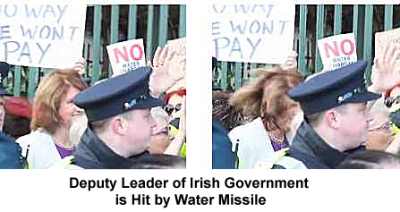
Joan Burton is the current Tanaiste (the deputy Prime Minister of the country) and was leaving an event that she had attended to mark a higher education graduation ceremony for students in Jobstown on the outskirts of Dublin city. The short walk to her car proved to be a very dicey affair when she was immediately surrounded by up to 100 protesters angry at the Government policy that will introduce water charges next year. The water charge is the latest in a series of 'austerity' measures that the Government has enforced and which includes the Property Tax. Homeowners now have to pay an annual tax based on the value of their property. Despite some protests and defiance that charge was successful introduced last year after the Government instructed the Irish Tax Service to refuse tax returns for those who had not paid (thus incurring penalties and charges) while also threatening to refuse to allow the sale of properties with arrears of property tax. Strong stuff. The protest collapsed. But things are a little different this time around. With a General Election looming (1916 at the latest but much more likely in 2015), there seems to be little appetite on the part of the Government to unleash this same weapon to break the protests. Emboldened by this opportunity some protesters have become even more militant with the events in Jobstown reaching new heights (or depths, depending on your perspective). 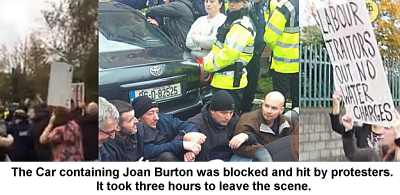
The Deputy-Leader of the country had to change cars on three occasions as the Gardai (Irish police) struggled to secure her safety. At one stage she was hit by a missile containing water, hit clear on the side of the head. Again we have to wonder what the response might have been in the US or Britain or France had a senior politician been so assaulted. The water missile could just have easily been a brick or a petrol bomb. A big increase in security for Government officials was ordered in the aftermath of the incident with the Taoiseach, Enda Kenny, also targeted by protesters who have vowed never to pay the new water charge. They are adamant that they have already paid enough tax and will not bow to further pressure from the European Troika who have imposed such financial misery on the country. The scene is set for a massive protest in December that the protesters are hoping will be enough to topple the Government, who are clearly shocked by the scale and ferocity of the attacks. How far do they dare to go to face down the protesters? With a General Election looming? It is game on. DUBLIN BIKE SCHEME A RESOUNDING SUCCESS The tourist scheme to 'rent-a bike' in Dublin, Cork, Galway and Limerick has gone from strength to strength. Over 2.1 Million journeys were undertaken in the year up to October. The scheme provides for the free use of secure bikes that are located at various locations around the cities. Cyclists can hop on a bike, complete their journey and then deposit the bike at any of the bike stands. No need to return it to its original stand. A smart-card facilitates the whole process that is available for a 20 Euro deposit. A three-day membership costs just 5 Euro. 1500 bikes at 100 stations make this a great way for peoplet to traverse Ireland's main urban centers. A great success. PROPERTY PRICE SURGE ACCELERATES If the Central Bank of Ireland wanted to create an environment whereby people started to panic-buy then they have succeeded. The Governor of the Irish Central Bank recently suggested that a 20% minimum deposit will be required before mortgages are issued by the main banks. Seems like a sensible enough step especially given our recent history of boom and bust (at one stage towards the end of the 'Celtic Tiger' mortgages of above 100% were being offered). The response was predictable. Cue a torrent of criticism from the vested interests, the banks themselves, estate agents, builders and even the Minister for Finance, Michael Noonan. In an apparent backdown the Governor of the Central Bank has revealed that a new insurance scheme may bridge any gap in funding that buyers face when trying to get a mortgage. The original proposal caused such a backlash that the Governor felt compelled to defend the original idea: 'We at the Central Bank will not shirk our responsibility to do what is in our power to deliver on our mandate to protect the new generation establishing households from the risk of a repetition of what happened before.' The severe shortage of properties in the major urban centers looks set to fuel the inexorable rise in prices, at levels not seen since 2008. Panic-buying has ensued, driving prices even higher. IRELAND HAS WORLD'S 6TH HIGHEST TAX BURDEN FOR HIGH EARNERS A study by accountants UHY Farrelly Dawe White has revealed that only Belgium, Denmark, France, Croatia and the Netherlands have higher tax bills than Ireland when it comes to top-flight earners. The notion that the rich in Ireland are somehow 'getting away with it' would seem to be countered by these statistics that show top earners taking home 49% of their overall earnings. By comparison the take-home is 54% in the UK and 57% in the US. Of course these bare statistic do not account for the various ways that accountants can squirrel away small fortunes in offshore accounts, trust funds, pensions schemes and various investment vehicles so perhaps the headline numbers should be taken with a pinch of salt. Ladislav Hornan is Chairman of UHY: The gap between how heavily you are taxed in Western Europe compared to other developed economies is striking, especially at the Euro 200,000 level. That's a typical income for a successful engineer, marketeer or head of IT. As the global economy improves and new job opportunities open up, Western European governments need to be aware of the risk of a brain drain of skilled professionals.' The same study also revealed that Ireland has the third lowest tax burden for low-income earners. IRISH SOCCER PLAYER SHORTLISTED FOR FIFA GOAL OF THE YEAR Stephanie Roche has made it to the FIFA shortlist of three, by beating off such world superstars as Zlatan Ibrahimovic and Diego Costa. Her stunning strike for Peamount United against Wexford Youths last October gained international recognition and she enters the final round of judging for the FIFA tribute. The competition is tough though. The World Cup in Brazil was the stage for Robin van Persie's lunging header for the Netherlands and for the James Rodriguez cracker for Colombia against Uruguay. 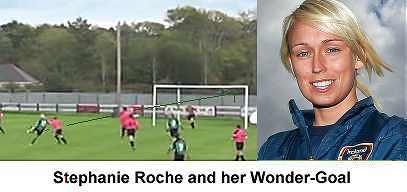
You can view all three goals here: (Please do Vote for Stephanie!) http://www.fifa.com/ballon-dor/puskas-award/video=2463789/index.html Technically there is no doubt that the goal scored by the 25-year-old Dubliner is the best of the three remaining candidates, but the glamorous surroundings of the World Cup may outdo her claims to the big prize. Let's hope not. |
|
KEEP THIS NEWSLETTER ALIVE! Free Mount with ALL Family Crest Prints, Framed or Unframed 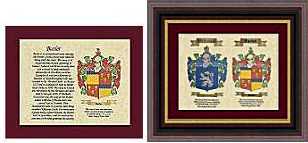
Order from Here |
Find Your Name in our Gallery of Irish Coats of Arms:
| A | B | C | D | E | F |
| G | H | I | J | K | L |
| M | N | O | P | Q | R |
| S | T | U | V | W | Y |
THE PERFECT WEDDING, ANNIVERSARY OR BIRTHDAY GIFT!
We have worldwide names available.
Get the Coat of Arms Print, Claddagh Ring,
Screensaver, Plaque, Tee-Shirt or Clock for
your name at:
https://www.irishnation.com/familycrestgifts.htm
|
================================ CHRISTMAS TRADITIONS OF IRELAND ================================ Ireland has a wide number of Christmas traditions that are steeped in the Gaelic and Catholic heritage of the country. THE WREN BOY PROCESSION The Wren Boy Procession has been revived in recent years with parades being held on St. Stephens Day in Sandymount in Dublin and other locations. There are several legends regarding the 'wren boy'. 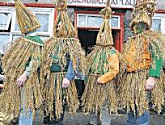
One such tale tells of a plot in a village against some British soldiers during Penal times. The soldiers were surrounded and were about to be ambushed when a group of wrens pecked on their drums raising the alarm. The plot failed and thus the wren became known as 'The Devil's Bird'. To commemorate this deed a procession takes place where a pole with a holly bush is carried from house to house and families dress up in old clothes and with blackened faces. In ancient times an actual wren bird would be killed and placed on top of the pole. It is possible that the very Irish tradition of visiting houses of friends and relatives on St. Stephens Day traces its origin to these events. THE CANDLE IN THE WINDOW A tradition that was very widespread in the 1970's but which seems to be dying out somewhat and especially in urban areas is the 'candle in the window'. Symbolically the candle represented a welcome to Joseph and Mary as they wandered in search of lodgings. The candle indicated to strangers and especially to the poor that there may be an offering of food in the house within. 
During the Penal Times in Ireland Catholic priests were forbidden to perform Mass so the candle acted as a covert signal that the occupier was a Catholic believer and that mass could be held on the premises. MARY Mary the mother of Jesus was especially revered in Ireland at Christmas. There are many traditions involving girls named Mary which at one time was by far the most popular female name in the country. The candle in the window was often to be lit by a girl named Mary and only extinguished by her. The removal of decorations in January were also often to be punctuated by a visit from a Mary. THE LADEN TABLE The centre-piece of the Christmas holiday in Ireland is the Christmas Dinner. After the often lavish meal the kitchen table was again set and on it was placed some bread and milk and the table adorned with the welcoming candle. If Mary and Joseph, or any wandering traveller, happened by then they could avail of the hospitality. LITTLE CHRISTMAS All Christmas decorations are usually taken down and put away on 'Little Christmas' (January 6th.). It is considered very bad luck to remove the decorations and Christmas tree before this date. 
IRISH CHRISTMAS DECORATIONS The widespread practice of placing a ring of Holly on a front door started in Ireland. Holly was one of the main plants that flourished at Christmas time in Ireland and gave the poorer population means with which to decorate their homes. 
MORE MODERN TRADITIONS Modern Ireland has changed vastly from the times when these Irish Christmas traditions flourished and have often been replaced with newer more secular ones. St. Stephens Day is still regarded as a day to visit family and friends but is also a great sporting day with horse-racing, football and a myriad of other sports taking prominence. Many workers take the entire week off between Christmas Day and New Years Day with many businesses completely closing down during this time. Midnight Mass on Christmas Eve is also very well attended and is often adorned with a choir, the Church with a Manger and Nativity scene. A Christmas Day swim is practised in certain parts of Ireland with perhaps the most famous being at the 'Forty Foot' tiny beach in South Dublin. THE TRADITIONAL GAELIC GREETING The Gaelic greeting for 'Merry Christmas' is: 'Nollaig Shona Duit' ......which is pronounced as 'null-ig hun-a dit'. |
KEEP THIS NEWSLETTER ALIVE!
Get Great Family Crest Gifts at:
|
========================== HOLDING THE FLASHLIGHT A Story by Marie O'Byrne ========================== Through the eyes of a child, the night rain seemed harsher, colder and somehow more threatening than the softer showers of the day. I was about ten years old and my job was to hold the flashlight for my mother while she hung out the clothes in the back garden. After a long day of housework she usually only got around to hanging out the washing in the late dark evenings after supper. It was pitch black down there at nighttime, surrounded by tall trees and thick hedge. We could see the light from the kitchen window in the distance but it was too far away from us to be of any benefit. I had to shine the light down on the big basins in the grass so my mother could see what clothes she picked out and then shine it up on the clothes line. 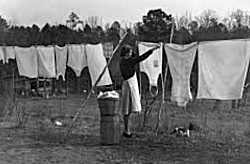
'Hold it steady, Marie. Shine it up on the clothes line and be still, good girl,' said my mother as she stretched her arms up and searched with her cold hands along the narrow line for more clothes pegs. It was raining as usual - my mother wore her old navy blue raincoat and head scarf. I stood close beside her, an umbrella in one hand and the flashlight in the other. Dozens of wet socks, and underwear, trousers, shirts and cardigans, there seemed to be no end to all the wet clothes in those big plastic basins and we hadn't even taken the towels and sheets out yet. My mother was the only person I ever knew who hung the washing out in the rain. She believed that the cold fresh rain would give the clothes a good rinsing during the night, but more importantly, it also relieved her from the daunting task of having to rinse out all the clothes in the little sink. A brilliant idea on her part I think. Necessity is the mother of invention they say. With thirteen people in our family and no washing machine, it was understandable that my mother always seemed to be in a constant state of laundry processing. It was a familiar sight to see buckets and basins full to the brim of socks and underwear soaking in Ariel by the kitchen door or on the back steps while the towels and sheets soaked in the sink and in the old metal bath tub. She would only stop this daily, never ending job, to run and stir the stew cooking on top of the range or to clean and sweep the floors of the cottage or tend to the children. Of course, if a neighbor showed up at the door she would stop all her work and make a cup of tea and sit for a quick chat. She always made time for people who dropped by, making them feel welcome and important even though she knew that this set her work schedule back and that she would end up, yet again, having to hang out all the clothes in the dark. I was afraid of the dark, being outside in the back garden at nighttime scared the wits out of me. The grunting and rustling sounds from the old hedgehog that lived in the bushes only added to my fear. When I reflect back, I think my mother was also afraid of the dark as she would always sing a song to me as she hung out the clothes, 'Que Sera Sera' was her favorite and I sang along with her, dancing around in the wet grass to keep warm, my eyes darting from tree to tree, scanning the blackness and wishing I could just run back to the warmth of the cottage. The sweet smell of the burning peat and wood wafting in the damp air taunted and beckoned me inside. 'Hurry up, Ma,' I whispered under my breath. Her cold hands continued to search in the darkness for the next wooden peg and on and on down the line she went - bending, reaching and pulling - bending reaching and pulling. Finally, with the last of the clothes hung out, my mother pushed the two loaded lines up higher into the black night sky using the two long wooden poles for support. My father had made the poles from tall ash trees that he had carefully selected up in the woods. She would turn to me as she gathered up the basins and say, 'We're all done now love, lets pray for a good day tomorrow!' A good day in my mother's eyes was when the rain died down during the night and the cold sea breeze coming in from the East picked up quickly. She loved to see her clothes flying high in the forceful wind, flapping and folding into each other. She knew that the drier the clothes were coming in from outside, the less time they had to spend 'airing' on the little clothes line that hung under the mantelpiece of the old range, or on the backs of the kitchen chairs. With the old range being the only source of heat in the cottage, she didn't want to have it covered and cluttered with clothes when we all came in from school cold and tired. However, all the clothes had to be 'aired' by the fire before she put them away in the clothes press. Growing up in Ireland, during the 1960's, was very tough, it was a time of great hardship with few material comforts. I didn't know anyone on our road who owned a washing machine or a tumble dryer. Even though we lacked the material things we were rich with an abundance of love and family unity and we were always assured of our mothers loving presence and support. She was full of kindness, joy and laughter and I am very thankful for all the wonderful memories. With such a large family, everyone had a job to do, the boys did most of the outdoor chores and we six girl's did the inside jobs, we all helped each other out, whether it was setting the table, peeling the potatoes or washing the dishes, it was just an everyday part of life growing up in a large family. Looking back, I wouldn't trade one of those dark rainy nights with my mother for anything in the world. Marie O' Byrne http://www.marieobyrne.com |
KEEP THIS NEWSLETTER ALIVE!
Solve your gift problem at: https://www.irishnation.com

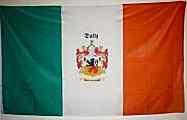
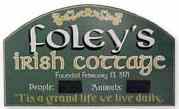
==============================
GAELIC PHRASES OF THE MONTH
==============================
| PHRASE: | Nollaig faoi shean is faoi mhaise duit! | ||||||
| PRONOUNCED: | Nullig fwee yan iss fwee mway/shih dwit | ||||||
| MEANING: | A prosperous and enjoyable Christmas! | ||||||
| PHRASE: | Nollaig Shona duit | ||||||
| PRONOUNCED: | nullig hunna dwit | ||||||
| MEANING: | Happy Christmas to you| PHRASE: |
Athblian shona duit |
PRONOUNCED: |
ought/bleen hunna dwit |
MEANING: |
Happy new year to you |
|
View the archive of phrases here:
https://www.ireland-information.com/irishphrases.htm
====================
COMPETITION RESULT
====================
The winner was: claygibson33@gmail.com
who will receive the following:
A Single Family Crest Print
(US$19.99 value)

Send us an email to claim your print, and well done!
Remember that all subscribers to this
newsletter are automatically entered into the
competition every time.
I hope that you have enjoyed this issue.

by Michael Green,
Editor,
The Information about Ireland Site.
https://www.ireland-information.com
Click here to contact us
Google+
PLEASE 'LIKE US' ON FACEBOOK!
KEEP THIS NEWSLETTER ALIVE! Visit https://www.irishnation.com
(C) Copyright - The Information about Ireland Site, 2014
P.O. Box 9142, Blackrock, County Dublin, Ireland Tel: 353 1 2893860